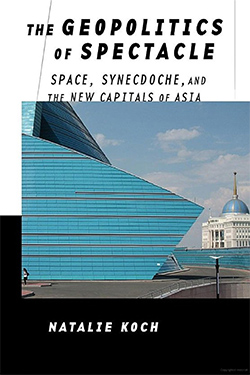The Geopolitics of Spectacle: Space, Synecdoche, and the New Capitals of Asia
Natalie Koch
Cornell University Press, December 2018

In her recently published book, Natalie Koch, associate professor of geography, introduces a new, expansive methodology for analyzing spectacle, governmentality, and urban space. The Geopolitics of Spectacle: Space, Synecdoche, and the New Capitals of Asia (Cornell University Press, 2018) draws from Koch’s extensive work on Central Asia, the Arabian Peninsula, and Southeast Asia to evaluate how autocratic rulers use spectacular projects, such as “lavishly built landscapes and celebrations,” to govern and legitimate their power.
Unlike previous studies of spectacle, which focus on spectacular projects themselves, Koch’s book invites readers to consider not only the spectacular, but the unspectacular as well. Through an in-depth case study of the Kazakh capital of Astana, Koch develops numerous comparisons between Astana and other spectacular capital cities. From Ashgabat (in Turkmenistan) to Naypidaw (in Myanmar), The Geopolitics of Spectacle locates and identifies the different unspectacular spaces and social experiences, from small villages to resource extraction zones, that make the spectacular both intelligible and meaningful. The result is a book that not only offers new empirical insights about various spectacular cities, but also promises a fresh theoretical approach to analyzing spectacle.
Koch, also an O’Hanley Faculty Scholar at the Maxwell School, is a leading scholar in political geography whose research focuses on resource-rich states in Central Asia and the Arabian Peninsula. At Maxwell, Koch serves as the faculty coordinator for the Central Asia and the Caucasus Research Group.
Her awards include the prestigious Meredith Professors Teaching Recognition Award (from Syracuse University) and Maxwell’s Daniel Patrick Moynihan Award for Outstanding Teaching and Research. In addition to numerous journal articles, Koch has previously edited and published a collected volume titled Critical Geographies of Sport: Space, Power, and Sport in Global Perspective (Routledge, 2017).
From the Publisher
Why do autocrats build spectacular new capital cities? In "The Geopolitics of Spectacle," Natalie Koch, associate professor of geography and the environment, considers how autocratic rulers use "spectacular" projects to shape state-society relations, but rather than focus on the standard approach—on the project itself—she considers the unspectacular "others." The contrasting views of those from the poorest regions toward these new national capitals help her develop a geographic approach to spectacle.
Koch uses Astana in Kazakhstan to exemplify her argument, comparing that spectacular city with others from resource-rich, nondemocratic nations in central Asia, the Arabian Peninsula, and Southeast Asia. "The Geopolitics of Spectacle" draws new political-geographic lessons and shows that these spectacles can be understood only from multiple viewpoints, sites, and temporalities. Koch explicitly theorizes spectacle geographically and in so doing extends the analysis of governmentality into new empirical and theoretical terrain.
With cases ranging from Azerbaijan to Qatar and Myanmar, and an intriguing account of reactions to the new capital of Astana from the poverty-stricken Aral Sea region of Kazakhstan, Koch’s book provides food for thought for readers in human geography, anthropology, sociology, urban studies, political science, international affairs, and post-Soviet and central Asian studies.